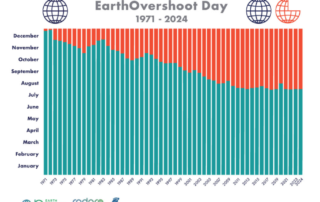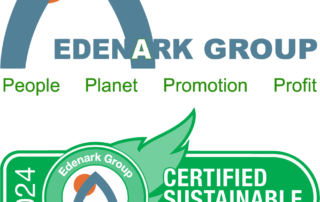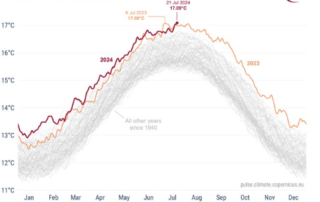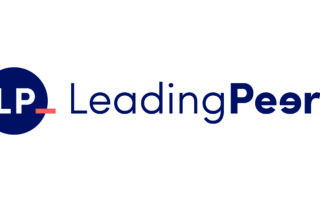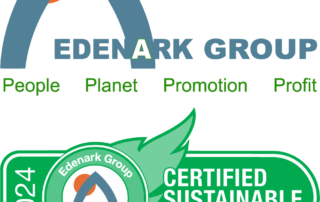Find and see the best corporate environmental sustainability news, posts and stories here, at Edenark Group’s “IN THE NEWS.” Let us know if you have environmental sustainability news you would like us to add.
Could you do the favor of not eating or consuming for balance of year?
Here we are again – Earth Overshoot Day.
This is the day each year when we have exhausted the Earth’s production for that year.
Imagine over-spending your household budget every year, for 53 straight years. Would you still have a house to live in?
The cupboard is bare and the payment notices are piling up.
So, back to the ask – Can you simply stop eating and consuming for balance of year?
If not, how about helping solve the problem?
Read this on what you want in a sustainability program, watch this master class, and contact us.
What is the #1 thing you, as an individual, can do, to help the environment?
Most people recognize the environmental problems we are facing. This is not a complete list, but it is sobering, nonetheless:
- CO2 emissions have increased 50% by 1990, accelerating global warming and impacting all life on Earth
- 90% of us breathe polluted air, causing 7 million deaths a year
- Almost all of us drink contaminated water, causing 5 million deaths a year
- Our oceans are overfished, increasing in temperature and full of plastics and waste
- Nearly 25% of animal species are at risk of extinction
- Forests are being destroyed
- We are not producing enough food
Most people say, “I would love to help, but what can I do?”
Let’s start the answer with this article about a rancher destroying the Amazon rain forest to raise cows for your hamburgers. He takes the risk, and admits he is doing the damage, because our demand for meat is so great.
You probably know Processed Meat (any meat treated to improve favor or last longer, like deli meat or any meat in a package), is a Group 1 Carcinogen; in the same cancer-causing camp as asbestos, arsenic, mustard gas, neutron radiation, plutonium, cigarette smoking…
You probably know Red Meat is a Group 2 Carcinogen; in the same cancer-causing camp as formaldehyde, nitrate, silicon carbide…
You probably know that white meat and fish are expected to be added to the Group 2 list due to the impact of commercial meat factories…
You probably know that +90% of the meat you purchase at the store has fecal matter in it…
You probably know that animals are the middleman to you getting the protein you need…
You probably know the human body, from our teeth to our digestive tract, is built for plant digestion, not meat digestion…
You probably know meat harms your gut and biome and plants rebuilds it…
You probably know meat will increase your calories, cholesterol, risk of heart disease, risk of mental disease, risk of gastro-intestinal disease…
You probably know that a plant-based diet will be less expensive and healthier.
But did you know, the biggest opportunity we have to address our environmental problems and global warming is….reduced meat production?
- 18% of global greenhouse gas emissions and climate impact is from the production of meat. This is equal to the emissions from all the cars, trucks, planes and boats.
- 75% of the world’s agricultural land is used for the production of meat (including the Amazon land destroyed in the above article)
- 20% of global fresh water is used in the production of meat
So, the next time you get ready to take a bite of your expensive hamburger, remember:
- It likely has fecal matter in it
- Your body was not built to digest it
- The protein is from plants
- You will get fatter and die younger from it
- It is the biggest opportunity we have to correct our environmental / climate problem
- And, you have control over what you eat
When should you talk and when should you hush?
We previously reported that Lululemon was in trouble in Canada for greenwashing.
The hits keep-a-comin’ as a class action suit has been filed in Florida.
Why do companies get in trouble over this issue?
- The environment is the #1 issue on the minds of consumers
- Consumers want to hear what your company is doing about it
- Certified sustainable companies are growing up to 20x faster than their peers
- It is so easy to say you are sustainable
But, if you are not environmentally certified sustainable with 3rd party verification on your claims
- Hush
- Get certified sustainable with 3rd party verification, then talk all you want (within the limitations of your certification)
If you want to say what consumers want to hear, read this on what you want in a sustainability program, watch this master class, and contact us.
What should You look for in an Environmental Sustainability Program?
Per this master class, there are 8 components of a sustainability program that will be successful and make you happy:
- It MUST include Employee Performance / Health
- Sustainability is not just about energy savings or ‘Greening Up’, it is about people
- For most businesses, the employees are one of the biggest costs, one of the biggest risks (mistakes, insurance, law suits) and one of the biggest opportunities (new ideas, collaboration, product knowledge)
- Every organisation suffers from the Big 5 – insomnia, stress, anxiety, physical pain, mental acuity
- You are losing 5% of your corporate profit/year to the Big 5
- It takes a lot of LEDs to make up for one worker comp or workplace violence case
- Make sure your program has a ‘people piece’ that addresses employee performance, health and happiness
- It MUST certify the business not the box
- People care about things that involve people
- Most building (ie, ‘Box’) certifications only care about building energy
- Building certifications are expensive and hard to market (poor ROI)
- You want to say, “Buy more of my product because we are a certified sustainable business”
- You do not get much value from, “Buy more of my product because we are in an energy efficient building”
- You want the certification on your business, not the building your business is in
- It MUST have a 3rd party audit component
- Oversight delivers credibility and trust
- From passing your driving test, to getting your college diploma, to passing a bar exam, we use 3rd parties to ensure compliance
- There are many sustainability programs that deliver a certification based on your ‘word’…..and your payment
- Don’t do it!
- Make sure the program you choose uses a 3rd party to validate your work
- It MUST follow a respected and integrated global standard
- The sustainability industry is maturing and coalescing around few standards
- The UN has created its SDGs (17 sustainability development goals)
- 50% of the world’s economies require sustainability reporting
- Greenwashing lawsuits are growing
- Don’t pick a program that is not globally respected by, and integrated with, the world leadership groups; and that does not have the ability to integrate the other three legs of the stool – carbon neutrality, ESG and net zero
- No reason to spend the time and money, then find you are not following the same programs and protocols that the leadership groups have adopted
- It MUST include promotion of the certification
- Historically, sustainability has been a cost-side play
- Most programs and providers have been 100% trained and focused on cost-side measures – energy reduction, carbon reduction, waste reduction, water reduction, travel reduction (ie, engineering)
- But we know consumers are searching for certified sustainable companies
- If you don’t talk about being certified sustainable they will never know you are (ie, marketing)
- You want a program provider that is built to do the cost-side work AND the revenue-side work; and helps you promote your certification
- It MUST pursue continual improvement
- Sustainability is not finite. It requires long-term commitment
- But…change is hard for all of us
- If the bar is set too high, we can get frustrated and give up
- You want a program that lets you come as you are and allows you to continually improve
- This will keep everyone happy and committed year after year
- It MUST require annual updates
- Current = credible
- Sustainability is not finite; we need to continually improve
- You don’t want a program that does not have a date attached to its certification
- You want to continually improve, see your success, and annually update your certification to show you are current and credible in your actions
- It MUST be at a price you can afford and produce a positive ROI
- We could have started with cost but you need the above seven components at a price you can afford
- It needs to show a positive and rapid ROI
- The cost includes both money and time and covers everything – the certification, the 3rd party audit and your work to become certified
As stated, we deliver all eight components mentioned above to our clients.
We enjoy a 100% client renewal rate – every year, every client has a decision to make and every year, every client has renewed.
If you use a program that delivers all of the above, you will probably be happy too.
Are you Nero?
This past Sunday, 21 July, 2024, was the hottest day ever recorded.
It is doubtful it will hold the record long. Last month was the hottest June on record globally and the 13th month in a row that broke records for high temperatures.
For those of you who believe this is just Mother Earth doing her thing, the last time Earth was this hot was approximately 120,000 years ago (the Eemian period). But the real marker we are targeting is the PETM period, which was about 55 million years ago. That was when temperatures were about 10 degrees C (15 degrees F) higher than today, there was no polar ice and oceans were about 230 feet (70 meters) higher. Due to our impact on the environment over the past hundred years, we are heading there millions of years early.
“We are now in truly uncharted territory and as the climate keeps warming, we are bound to see new records being broken in future months and years,” Carlo Buontempo, the director of the Copernicus Climate Change Service, said in a statement.
“We’re going to have to have massive readjustments in the way in which we live our lives” as heat intensifies, said Bharat Venkat, the director of the UCLA Heat Lab, which studies the effects of rising temperatures.
So…..now that you have been put on notice, what will you and your business do about it? Will you boldly say something like, “We should all do more!” then forget all about it and get back to your (very warm) day?
Are you Nero?
Have you ever considered being part of a Peer Advisory Board?
Dear friends,
I spent the majority of my career as a corpoate turnaround / scale up CEO. It provided a rich and diverse experience; and I am truly thankful for all I learned.
As part of my Pay It Forward, I am a member of Leading Peers and chair a peer advisory board of CEOs.
The board meets virtually and we have US-based, and non-US-based CEOs, that are part of the group.
This is a flyer on the benefits of the group.
If you ever felt you might benefit from having a peer group of CEOs to confidentially share with and grow with, give this some thought.
If you would like more information you can contact me directly or contact Diane Pallini at dianepallini@leadingpeers.com.
You will make professional friends and your business will benefit from the group’s guidance.
Sincerely,
David Goodman, CEO, Edenark Group
Are you using sustainability as a growth tool?
Per this article, CEOs are using sustainability to frame how they compete.
54% say their business is impacted by changing weather patterns and this is causing them to change how they operate.
“Smart CEOs realize big sustainability challenges create new areas of business opportunity,” states Kristen Moyer of Gartner, in the article.
Are you prepared for the fact that the environment of the future is not going to be as forgiving as the environment of the past?
Are you changing your business operation to adjust for the impact of climate change?
Are you listening to consumer demand that you verify your sustainability commitment?
Are you prepared for government compliance regarding your sustainability efforts and claims?
In effect, is sustainability part of your strategy to survive and compete?
If you are ready to prepare your company to compete in the world of today and tomorrow, read this on what you want in a sustainability program, watch this master class, and contact us.
How will the new UK Supreme Court Ruling Impact your actions?
On 20 June 2024, the UK Supreme Court Ruled that ALL Fossil Fuel Projects Must Be Assessed for Future Impact.
This ruling reflects a broader trend of courts across the world. That trend being that the courts are not just looking at the environmental impact of developing the project, but also the long-term environmental impact that the project, once completed, will create.
In other words – If built, will the project do more long-term harm than good? And, is there a better way to achieve the goal?
What does this mean for you?
- It will be harder for UK fossil fuel projects to be built
- It will move UK focus and financing to alternative energy projects
- It will impact UK sources and uses of energy
- It will influence global energy financiers beyond the UK market
- It will influence global governments and courts outside the UK market
As consumers look at your business, what side of this debate do they see you – are you part of the fossil fuel old guard or are you part of the eco-conscious future?
If you wish to be viewed as part of the eco-conscious future, how are you validating that claim?
If you want cnsumers to see you as part of their future, and you wish to satisfy compliance, read this on what you want in a sustainability program, watch this master class, and contact us.
People want to work for Environmentally Sustainable Companies
This article in the New York Post reports on this study and is consistent with other studies we have reported. Key points
- Almost two-thirds of respondents stated they were more likely to apply to a job for a company that committed to sustainable practices.
- Three out of five respondents said they avoid employers they perceive as having a negative impact on the environment.
- 54% of respondents said that sustainability played a role in their motivation to work remotely.
Simple math – If you are looking to hire and 60% of the possible candidates will avoid you if they perceive your company is a negative impact on the environment, your hiring effort will be negatively impacted.
Sure, you can mask it. But once they learn the truth, and they quit, the cost to you will be greater than had they not taken the position in the first place.
The Under 40 worker wants to work for a company that can prove it cares about the environment. The Under 26 worker has an even higher expectation of same.
Those are the workers that are the future of your company.
If you want to improve your ability to hire and retain talent, read this on what you want in a sustainability program, watch this master class, and contact us.
Canada’s New Greenwashing Law will Impact US/Global Brands
Consumer demand that companies show they are environmentally friendly has grown dramatically over the past few years causing greenwashing (making false claims about environmental actions) to grow even faster.
Per this article, according to a recent study by Zippia, 72% of North American and 58% of global companies admit to embellishing their environmental claims for economic gain. (When they are asked confidentially, the number is even higher).
Canada is looking to slow corporate greenwashing via its new Bill C-59 by requiring claims to be supported with a valid/respected certification and 3rd party verification.
The C-59 fines are steep – up to $15 million, or three times the value of the ill-gained profit or 3% of the company’s profit…per offense.
Needless to say, this will impact more than Canadian companies. It will impact any company selling product into Canada.
The EU already has similar laws. Expect the rest of the world to follow suit.
If you want to get ahead of this and use it to your advantage, read this on what you want in a sustainability program, watch this master class, and contact us.

